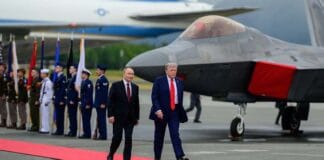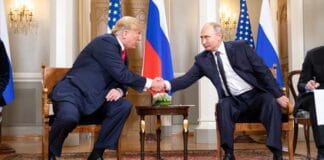Russia has suffered a further defeat in Ukraine, withdrawing from Kherson, the only regional capital that Russian forces successfully occupied since their invasion earlier this year.
The Ukrainian advances have relied on massive quantities of US and NATO weapons, in particular precision guided HIMARS missile systems that have allowed Ukraine to target Russian ammunition depots and command posts behind the front lines.
The US is fueling the war with over $19 billion in military aid, supplying over 10,000 anti-aircraft systems, nearly 40,000 anti-armour systems, nearly one million artillery rounds, over 100 million small arms munitions, and thousands of armoured vehicles, aircraft, and tanks. The total support from NATO members reaches over $40 billion—around $150 million every day.
The EU has also stepped up its monetary support for the war voting on 24 November to approve a conditional loan to Ukraine of $28 billion that is enough to cover roughly half of the estimated $5-6 billion monthly funding Ukraine needs in 2023.
The EU says the loan is to assist Ukraine both for reconstruction and its path towards EU membership, inflaming one of the contentious issues of the war.
Putin is desperate to hold onto the territory he has already seized, and resist any move by Ukraine to re-take Crimea. Russia has responded to the loss of Kherson by attacking Ukraine’s power grid and water supply.
No end in sight
General Mark Milley, the US Chairman of the Joint Chiefs of Staff, has publicly urged Ukraine to seek a diplomatic resolution to the war, saying a complete Ukrainian military victory was not feasible.
But other US officials have reinforced their commitment that the US is “going to be with Ukraine for as long as it takes in this fight.” And that “There will no wavering, no flagging, no flinching in our support as we go forward.”
But the opposition to negotiations and the wider implications of the war for Western imperialism was made clear by former Ukrainian member of parliament Hanna Hopko, at a recent international security forum.
“So, this is our answer to all negotiations,” Hopko said. “It’s about defeating Russian imperialism so that they never become a threat, not just for Ukraine—for Belarus, Moldova, for Georgia, Venezuela, Syria. And not supporting China in a potential attack on Taiwan and others.”
Russia and Ukraine have both suffered an estimated 100,000 casualties, but it’s clear the war is set to drag on. And the threat of Russian use of nuclear weapons is an ever-present danger in the face of increased military escalation by the West.
After a visit from French President Emmanuel Macron US President Joe Biden announced that he would be “prepared to speak with Mr. Putin” if he was “looking for a way to end the war.”
However, Biden also said he had “no immediate plans” to reach out to Putin and secured a joint statement with Macron that the US and NATO will “stand as strong as ever against Russia’s brutal war in Ukraine.”
Such is the extent of the arms going to Ukraine that the US and NATO are beginning to reach the capacity of their military production. In some munitions factories, shifts have been running for 24 hours a day—prompting discussion of opening further large-scale arms manufacturing plants, including in Poland, to meet demand.
As the Financial Times put it, “At stake is not only the west’s ability to continue supplying Ukraine with weapons… but also [the West’s] capacity to show adversaries such as China that they have an industrial base that can produce sufficient weaponry to mount a credible defense against possible attack.”
In other words, the US is using the war to send a signal to China about its ability to defeat its rivals.
Australia has been in lock-step with the US, sending hundreds of millions in military aid, including dozens of Bushmaster armoured vehicles.
Ordinary people have nothing to gain from this conflict.
While we suffer soaring energy prices and falling wages, Labor is pouring millions into weapons, nuclear submarines and extending US bases, rather than funding public health, or a desperately needed transition to renewable energy.
We need to oppose our government’s efforts to send arms that are only further fuelling the conflict between the West and Russia.
By Maeve Larkins






